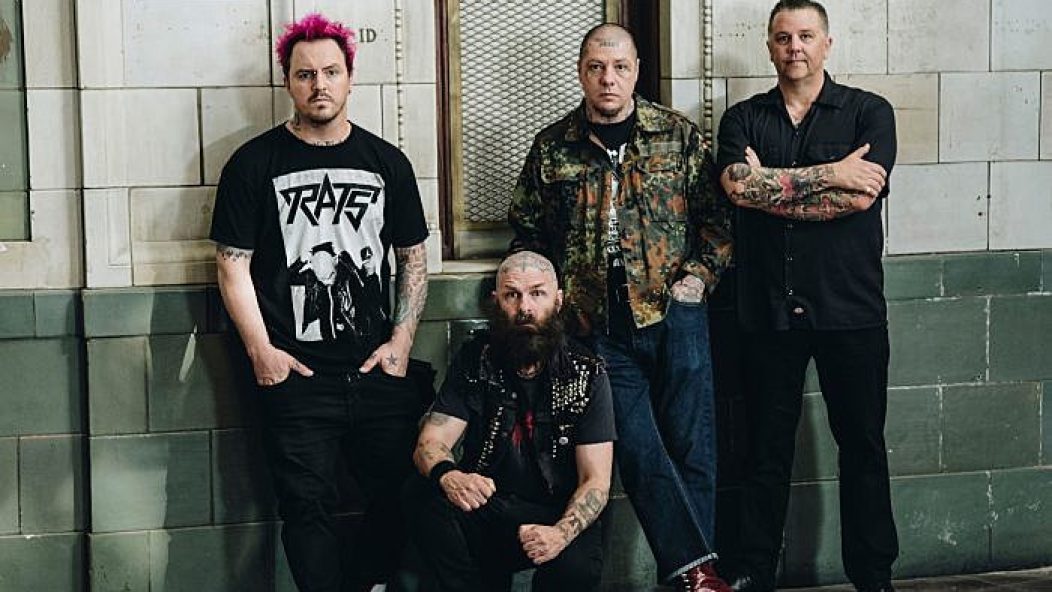
Rancid were absolutely crucial to the fusion of ska, reggae and punk rock
Berkeley’s Rancid, history’s most commercially successful street punk band, also have deep-running ska/rock steady/reggae roots. After all, both singer/guitarist Tim Armstrong and bassist Matt Freeman got their start in 924 Gilman Street heroes Operation Ivy, who almost single-handedly invented ska-core. Don’t buy it? Listen to “Sound System” and you tell us.
With such a pedigree, it stood to reason the Jamaican riddims would rear their head at some point in Rancid’s development. Reggae imagery pervaded Armstrong’s lyrics almost from the get-go, though ska did not inject itself into their musical stew until 1995 breakthrough LP …And Out Come The Wolves, especially noticeable on hit single “Time Bomb.” From that point, their every release (except the self-titled, turn-of-the-century, all-hardcore statement) numbered at least three or four ska-punk tracks among its highlights.
Read more: Rancid’s August 1998 cover from AltPress captures legends on the rise
Eventually, enough ska-punk piled up in their discography that long-serving London bootboy punk outfit Cock Sparrer’s Daryl Smith compiled 22 such tracks in 2015. Dubbed All The Moon Stomper’s, these deep cuts, B-sides and compilation contributions effectively argued Rancid’s importance to the punk/reggae/ska fusion. It places them alongside their heroes the Clash. Missing such crucial pieces of the puzzle as their long out-of-print live rendition of “The Harder They Come” is a minor quibble.
Beyond all that, Armstrong has been a hands-on, vocal advocate for ska-punk. He signed such pivotal roots or fusionist acts as the Slackers, the Aggrolites and the Pietasters to his Hellcat Records label. He produced and played on Jimmy Cliff’s 2012 roots-heavy Rebirth album, featuring a ska remake of “Ruby Soho.” Armstrong also signed, produced and served as a mentor to the Interrupters, the most significant modern ska-punk outfit. He definitely puts his cash where his piehole resides.
Read more: How ska paved the way for punk… and took over the world along the way
Bearing all this evidence in mind, please enjoy our custom playlist, Alternative Press presents Crucial Rancid Ska-Punk. Consider the rest of this article the liner notes.
“Time Bomb” (…And Out Come The Wolves, 1995)
“Black coat, white shoes, black hat, Cadillac, yeah/The boy’s a time bomb.” Can anyone forget the first time they heard Armstrong’s shopping list of rebel style shouting out of a radio or MTV? Rancid’s first stab at ska became one of the early singles establishing them as commercial punk contenders. It’s an outlaw ode as perfect as Cliff’s original “The Harder They Come”: “Now he’s gotten out he’s gotten free he’s gotta go, gotta car/He’s 21 years old, he’s runnin’ from the bar/His pager’s beepin’, he’s got in deep in/Whatever he can move on in you know that kid’s a creepin’.”
“Daly City Train” (…And Out Come The Wolves, 1995)
“Some grow up and some grow old,” Armstrong gruffly muses midway through this tale of the fall of Jackyl, “an artist and a writer and a poet and a friend.” “But what about the kid who never learned the rules?” The lyric follows Jackyl as he shoots smack in a train station men’s room, bobs and weaves whilst drinking beer and makes decisions that land him in the legal system. Yet for “all this evil and wreckage, yeah/He maintained a sense of himself, yeah.” The ska pulsebeat percolating beneath this bleak scenario somehow offers an odd sense of hope.
“Brixton” (Rock Stars Kill comp, 1994/All The Moon Stomper’s, 2015)
“I saw a new generation coming/Under the smoke over Oakland,” guitarist Lars Frederiksen and his bandmates shout in jubilation over the deceptively bubbly power-chord ska of this compilation track. It’s a trick Rancid employ often — joyous music belying stark lyrics. This time, it’s an account of a riot in their backyard: “250 dead, the Tribune read/Oakland’s going off like a bomb!” Midway through, Frederiksen scoffs: “Every time I turn around, it’s just the same story/And it’s like ‘It just don’t seem right and I wonder, is it gonna end?’” A tender heart beats at the center of this rebel anthem.
“Life Won’t Wait” (Life Won’t Wait, 1998)
The fourth Rancid album expanded their remit to weave funk, hip-hop, rockabilly, dub and heavy-duty reggae elements through the usual Clash-like punk rock. For their trouble, comparisons to Joe/Mick/Paul/Topper’s expansionist Sandinista! were bandied about. The reggae-heavy, Frederiksen-sung title track was one of two recorded in Kingston, Jamaica, enabling the participation of dancehall star Buju Banton. “Dynamite blast of the force of war,” Armstrong mourns between warnings that “division is the new world order.” “Government rides on the weak and poor/Don’t want to see my brother in pain no more/When the little man fights all the big man’s wars.”
“Cocktails” (Life Won’t Wait, 1998)
Rancid have an onstage tendency to play this one as a straight-up rocker. But it emerged from Life Won’t Wait as a pure-bore ska song, punctuated by Armstrong’s wheezy Bob Dylan-style harmonica bursts. “I ain’t lookin’ for answers,” the two guitarists harmonize between verses rhapsodizing a lost soul tiring of life on the Lower East Side. “I don’t want nothing for free.” After insisting she desires no one’s respect, in a typical erection of psychic walls, she demands to “know who’s talking to me.” This is a prime example of Armstrong’s talent for fully realized storytelling filled with sharply drawn characters.
“Wrongful Suspicion” (Life Won’t Wait, 1998)
Frederiksen opens and closes this burbling, trombone-driven reggae song toasting dedications to a number of New York-based punk, hardcore and reggae bands of the day. Then Armstrong strides up to the mic, unfurling a shopping list of injustices committed “down at the state house.”
He’s wrongfully accused at gun point of some unspecified crime, being told he’s lucky to have rights he’s not sure he has, but they’re part of some “hundred year tradition.” He just feels “they got a mental condition.” “Ignore the weak, ignore the poor,” he scoffs. “…But they do not know the law, no, not at all….What can we do?” It’s party music with teeth.
“Red Hot Moon” (Indestructible, 2003)
It’d been five years since the world enjoyed Rancid pogoing their way through some nimble ska. The album between Indestructible and Life Won’t Wait, 2000’s Rancid, was nothing but wall-to-wall thrash rockers. So hearing “Red Hot Moon,” with its joyous chorus about riding “the bus downtown to the graveyard shift tonight,” ignited a party in your eardrums. As usual, Armstrong was slipping grave concerns in on raucously upbeat music. Casey, the song’s protagonist, is a self-destructive punk rocker pushing away the world. Somehow, the singer felt “she’d be the one to get out of here and make a life for herself.” Instead, she’s found at a little league baseball diamond, “and no one knew why she wouldn’t wake up.” Skinhead Rob, from Armstrong’s Transplants side project, indicates during his concluding rap that armed robbery may have been involved in her apparent demise.
“Up To No Good” (Let The Dominoes Fall, 2009)
Rancid singles burning up the pop charts got left behind in the ‘90s, along with OK Soda and Beavis And Butt-Head. Which concerned the band not a whit: Their fanbase was loyal, and they could still pack large venues and command festival stages. Their records were also consistently strong, even if they were no longer annual affairs — it’d been six years since Indestructible! Let The Dominoes Fall bristled with killer tunes, especially this herky-jerky ska raver punctuated with Hammond B-3 stabs from Stax Records legend Booker T. Jones of the MGs. “This song is about survival at any means necessary,” Rancid explained at the time. “We understand what it means to hit rock bottom.”
“Liberty And Freedom” (Let The Dominoes Fall, 2009)
You’d be forgiven for thinking Rancid had gone folk, as Armstrong begins this track with acoustic guitar strums, solemnly reflecting upon the police state coming down. Then the upstroke guitars and light-on-its-feet rat-a-tatting of the drums kicks in, and it’s a ska party all the way. The band took to their Myspace page (in a time when bands still took to their Myspace pages) to explain “Liberty And Freedom”’s intentions: “Plain and simple, this song is about the systematic suppression of ideas and censorship. It’s also a protest song in the folk tradition of Woody Guthrie… The graffiti on the walls will always leave clues. Follow them.”
“Breakdown” (…Honor Is All We Know, 2014)
Five years later, …Honor Is All We Know shows up, with its welcome brace of rebel songs, punk rockers and ska bracers. Rancid’s genre mix-and-matching amps up with Frederiksen lacing slashing post-Johnny Thunders lead guitar through what’s otherwise straight party-time ska. Lyrically, “Breakdown” is a traditional, the band’s stab at a warning-to-rude-boys anthem such as Prince Buster’s “Judge Dread” series or Dandy Livingstone’s much-covered “Rudy, A Message To You”: “You better watch out, or you’ll end up in a cell/Break yourself or you’ll waste yourself.” It’s also easy to see how they were in turn absorbing some energy from ska-punks they’d influenced, such as the Interrupters.
“Where I’m Going” (Trouble Maker, 2017)
It takes real talent to make a paean to world destruction into a celebratory raver. Perhaps it’s because Rancid infuse it with joyous defiance: “You don’t understand where I am or where I’ve been or where I’m going.” They’ve seen trouble, been in it. With their backs against the wall, Frederiksen and Armstrong trade verses about how they’re fighting back against odds seemingly stacked against them from birth: “Retaliation is my crime/Communication, a waste of time…Knowing me, you know I’m never gonna learn/Get in line ’cause it’s your turn/Play with fire and you’re gonna get burned!”








